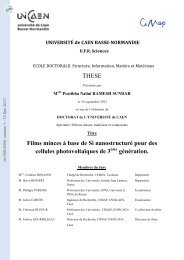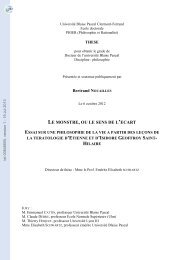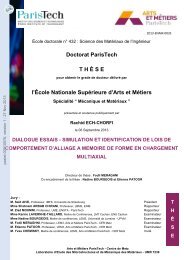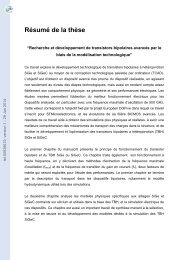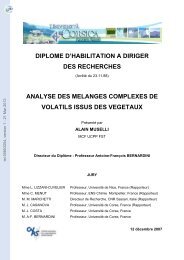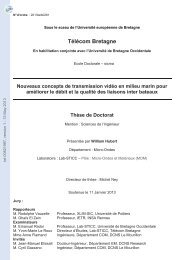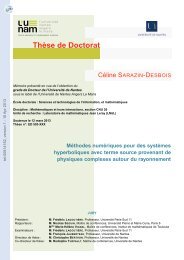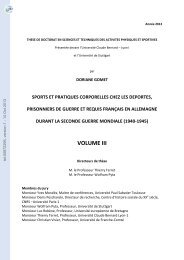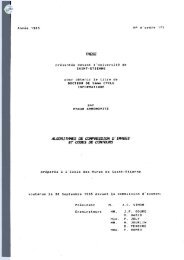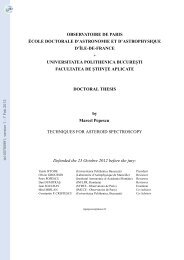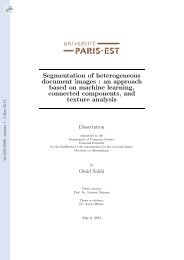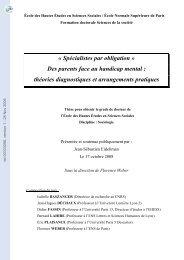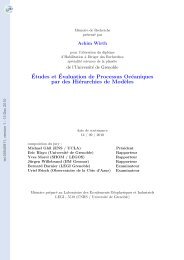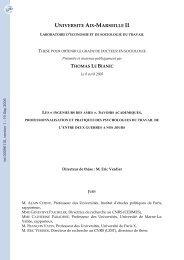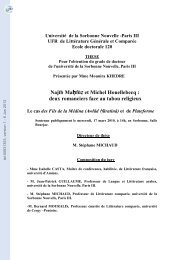- Page 1 and 2: tel-00827710, version 1 - 29 May 20
- Page 3 and 4: tel-00827710, version 1 - 29 May 20
- Page 5 and 6: tel-00827710, version 1 - 29 May 20
- Page 7 and 8: tel-00827710, version 1 - 29 May 20
- Page 9 and 10: tel-00827710, version 1 - 29 May 20
- Page 11 and 12: tel-00827710, version 1 - 29 May 20
- Page 13 and 14: tel-00827710, version 1 - 29 May 20
- Page 15 and 16: tel-00827710, version 1 - 29 May 20
- Page 17 and 18: tel-00827710, version 1 - 29 May 20
- Page 19 and 20: tel-00827710, version 1 - 29 May 20
- Page 21: tel-00827710, version 1 - 29 May 20
- Page 25 and 26: tel-00827710, version 1 - 29 May 20
- Page 27 and 28: tel-00827710, version 1 - 29 May 20
- Page 29 and 30: tel-00827710, version 1 - 29 May 20
- Page 31 and 32: tel-00827710, version 1 - 29 May 20
- Page 33 and 34: tel-00827710, version 1 - 29 May 20
- Page 35 and 36: tel-00827710, version 1 - 29 May 20
- Page 37 and 38: tel-00827710, version 1 - 29 May 20
- Page 39 and 40: tel-00827710, version 1 - 29 May 20
- Page 41 and 42: tel-00827710, version 1 - 29 May 20
- Page 43 and 44: tel-00827710, version 1 - 29 May 20
- Page 45 and 46: tel-00827710, version 1 - 29 May 20
- Page 47 and 48: tel-00827710, version 1 - 29 May 20
- Page 49 and 50: tel-00827710, version 1 - 29 May 20
- Page 51 and 52: tel-00827710, version 1 - 29 May 20
- Page 53 and 54: tel-00827710, version 1 - 29 May 20
- Page 55 and 56: tel-00827710, version 1 - 29 May 20
- Page 57 and 58: tel-00827710, version 1 - 29 May 20
- Page 59 and 60: tel-00827710, version 1 - 29 May 20
- Page 61 and 62: tel-00827710, version 1 - 29 May 20
- Page 63 and 64: tel-00827710, version 1 - 29 May 20
- Page 65 and 66: tel-00827710, version 1 - 29 May 20
- Page 67 and 68: tel-00827710, version 1 - 29 May 20
- Page 69 and 70: tel-00827710, version 1 - 29 May 20
- Page 71 and 72: tel-00827710, version 1 - 29 May 20
- Page 73 and 74:
tel-00827710, version 1 - 29 May 20
- Page 75 and 76:
tel-00827710, version 1 - 29 May 20
- Page 77 and 78:
tel-00827710, version 1 - 29 May 20
- Page 79 and 80:
tel-00827710, version 1 - 29 May 20
- Page 81 and 82:
tel-00827710, version 1 - 29 May 20
- Page 83 and 84:
tel-00827710, version 1 - 29 May 20
- Page 85 and 86:
tel-00827710, version 1 - 29 May 20
- Page 87 and 88:
tel-00827710, version 1 - 29 May 20
- Page 89 and 90:
tel-00827710, version 1 - 29 May 20
- Page 91 and 92:
tel-00827710, version 1 - 29 May 20
- Page 93 and 94:
tel-00827710, version 1 - 29 May 20
- Page 95 and 96:
tel-00827710, version 1 - 29 May 20
- Page 97 and 98:
tel-00827710, version 1 - 29 May 20
- Page 99 and 100:
tel-00827710, version 1 - 29 May 20
- Page 101 and 102:
tel-00827710, version 1 - 29 May 20
- Page 103 and 104:
tel-00827710, version 1 - 29 May 20
- Page 105 and 106:
tel-00827710, version 1 - 29 May 20
- Page 107 and 108:
tel-00827710, version 1 - 29 May 20
- Page 109 and 110:
tel-00827710, version 1 - 29 May 20
- Page 111 and 112:
tel-00827710, version 1 - 29 May 20
- Page 113 and 114:
tel-00827710, version 1 - 29 May 20
- Page 115 and 116:
tel-00827710, version 1 - 29 May 20
- Page 117 and 118:
tel-00827710, version 1 - 29 May 20
- Page 119 and 120:
tel-00827710, version 1 - 29 May 20
- Page 121 and 122:
tel-00827710, version 1 - 29 May 20
- Page 123 and 124:
tel-00827710, version 1 - 29 May 20
- Page 125 and 126:
tel-00827710, version 1 - 29 May 20
- Page 127 and 128:
tel-00827710, version 1 - 29 May 20
- Page 129 and 130:
tel-00827710, version 1 - 29 May 20
- Page 131 and 132:
tel-00827710, version 1 - 29 May 20
- Page 133 and 134:
tel-00827710, version 1 - 29 May 20
- Page 135 and 136:
tel-00827710, version 1 - 29 May 20
- Page 137 and 138:
tel-00827710, version 1 - 29 May 20
- Page 139 and 140:
tel-00827710, version 1 - 29 May 20
- Page 141 and 142:
tel-00827710, version 1 - 29 May 20
- Page 143 and 144:
tel-00827710, version 1 - 29 May 20
- Page 145 and 146:
tel-00827710, version 1 - 29 May 20
- Page 147 and 148:
tel-00827710, version 1 - 29 May 20
- Page 149 and 150:
tel-00827710, version 1 - 29 May 20
- Page 151 and 152:
tel-00827710, version 1 - 29 May 20
- Page 153 and 154:
tel-00827710, version 1 - 29 May 20
- Page 155 and 156:
tel-00827710, version 1 - 29 May 20
- Page 157 and 158:
tel-00827710, version 1 - 29 May 20
- Page 159 and 160:
tel-00827710, version 1 - 29 May 20
- Page 161 and 162:
tel-00827710, version 1 - 29 May 20
- Page 163 and 164:
tel-00827710, version 1 - 29 May 20
- Page 165 and 166:
tel-00827710, version 1 - 29 May 20
- Page 167 and 168:
tel-00827710, version 1 - 29 May 20
- Page 169 and 170:
tel-00827710, version 1 - 29 May 20
- Page 171 and 172:
tel-00827710, version 1 - 29 May 20
- Page 173 and 174:
tel-00827710, version 1 - 29 May 20
- Page 175 and 176:
tel-00827710, version 1 - 29 May 20
- Page 177 and 178:
tel-00827710, version 1 - 29 May 20
- Page 179 and 180:
tel-00827710, version 1 - 29 May 20
- Page 181 and 182:
tel-00827710, version 1 - 29 May 20
- Page 183 and 184:
tel-00827710, version 1 - 29 May 20
- Page 185 and 186:
tel-00827710, version 1 - 29 May 20
- Page 187 and 188:
tel-00827710, version 1 - 29 May 20
- Page 189 and 190:
tel-00827710, version 1 - 29 May 20
- Page 191 and 192:
tel-00827710, version 1 - 29 May 20
- Page 193 and 194:
tel-00827710, version 1 - 29 May 20
- Page 195 and 196:
tel-00827710, version 1 - 29 May 20
- Page 197 and 198:
tel-00827710, version 1 - 29 May 20
- Page 199 and 200:
tel-00827710, version 1 - 29 May 20
- Page 201 and 202:
tel-00827710, version 1 - 29 May 20
- Page 203 and 204:
tel-00827710, version 1 - 29 May 20
- Page 205 and 206:
tel-00827710, version 1 - 29 May 20
- Page 207 and 208:
tel-00827710, version 1 - 29 May 20
- Page 209 and 210:
tel-00827710, version 1 - 29 May 20
- Page 211 and 212:
tel-00827710, version 1 - 29 May 20
- Page 213 and 214:
tel-00827710, version 1 - 29 May 20
- Page 215 and 216:
tel-00827710, version 1 - 29 May 20
- Page 217 and 218:
tel-00827710, version 1 - 29 May 20
- Page 219 and 220:
tel-00827710, version 1 - 29 May 20
- Page 221 and 222:
tel-00827710, version 1 - 29 May 20
- Page 223 and 224:
tel-00827710, version 1 - 29 May 20
- Page 225 and 226:
tel-00827710, version 1 - 29 May 20
- Page 227 and 228:
tel-00827710, version 1 - 29 May 20
- Page 229 and 230:
tel-00827710, version 1 - 29 May 20
- Page 231 and 232:
tel-00827710, version 1 - 29 May 20
- Page 233 and 234:
tel-00827710, version 1 - 29 May 20
- Page 235 and 236:
tel-00827710, version 1 - 29 May 20
- Page 237 and 238:
tel-00827710, version 1 - 29 May 20
- Page 239 and 240:
tel-00827710, version 1 - 29 May 20
- Page 241 and 242:
tel-00827710, version 1 - 29 May 20
- Page 243 and 244:
tel-00827710, version 1 - 29 May 20
- Page 245 and 246:
tel-00827710, version 1 - 29 May 20
- Page 247 and 248:
tel-00827710, version 1 - 29 May 20
- Page 249 and 250:
tel-00827710, version 1 - 29 May 20
- Page 251 and 252:
tel-00827710, version 1 - 29 May 20
- Page 253 and 254:
tel-00827710, version 1 - 29 May 20
- Page 255 and 256:
tel-00827710, version 1 - 29 May 20



